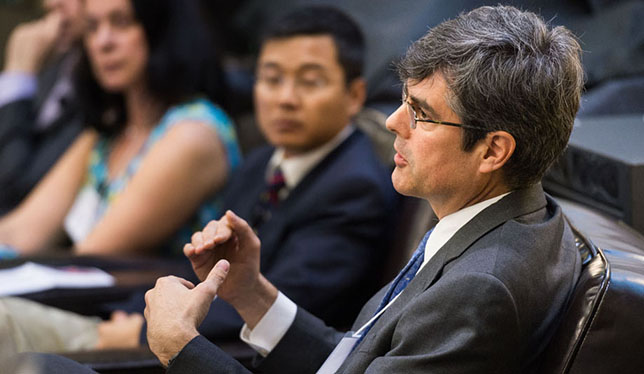
Energy, new frontiers in space, cyber security, socio-economic diversity, water security, reconciliation, human migration: these are some of the big issues Canada’s governments and communities are grappling with – and, with the help of a new travelling speaker series, universities are positioning themselves as the country’s go-to subject experts.
At the University of Alberta on April 18, Universities Canada and U of A hosted the official launch of Mindshare, a series that brings together top researchers, politicians, bureaucrats and industry leaders from Canada and abroad.
“Universities are spaces where challenging conversations and great thinking are happening, but they’re not great at promoting that,” says Janis Hass, senior communications specialist with Universities Canada, the association representing 97 Canadian universities (and publisher of University Affairs). That’s why the organization has teamed up with its member institutions to bring conversations to the public at forums across the country. Modeled loosely on The Walrus magazine’s Walrus Talks, each event takes an interdisciplinary approach to a single topic of local and international concern.
The Edmonton event focused on the future of energy systems. Andreea Strachinescu, head of the New Energy Technologies and Innovation unit in the Directorate General for Energy at the European Commission, discussed the European Union’s short- and longer-term targets for reducing greenhouse gases. A priority area of focus is developing EU technological leadership in low-carbon energy. But, looking beyond borders is part of the technological solution, she said. “We cannot be number one with all the technologies in the world … We need to look at how we are going to develop new technologies together.”
Imre Szeman, who holds the Canada Research Chair in Cultural Studies at U of A, spoke on the social and cultural dimensions of transitioning from an oil-based culture. Dr. Szeman’s research group studies “petrocultures,” which he defines as a society organized around energy and the products of fossil fuels. “We in Canada are a petroculture,” he said, adding, “The next steps in addressing environmental crisis will have to be led by the social sciences and humanities.” Dr. Szeman said we need to look at other ways of being, behaving and belonging. It’s a massive challenge and some wonder whether we have the capacity to take this challenge on, he noted.
Next up was Thom Mason, director of the Oak Ridge National Laboratory in Tennessee. A Nova Scotia native and Dalhousie University graduate, he focused on the science and technology needed to solve our energy issues, with a focus on the U.S. “It turns out we have a lot of work to do,” he said. The challenges include environmental impacts, national and global implications of energy scarcity, economic consequences of energy prices and energy access in developing nations, with billions of people still without access to electricity. Dr. Mason said major advances in basic science and supporting technology are needed to ensure success as we deal with these challenges. He argues that a full transformation of the global energy system is required.
Another international perspective was shared by Junjie Zhang, associate professor at the University of California, San Diego, who provided a frank assessment of China’s energy debate and a snapshot of its consumption trends. “The coal problem” remains the country’s main energy challenge, he said. While coal still dominates the country’s energy use, coal use is trending downward, now sitting at 66 percent of energy consumption.
The debate around energy consumption in China is increasingly driven by concerns about air pollution, particularly among the country’s growing middle class. Professor Zhang cited the practice of Chinese families buying homes in North American cities, like San Diego and Vancouver, to escape extreme air pollution. If China decides to limit greenhouse gas emissions, he said, it’s because of citizens’ concerns about air pollution.
In the Q&A session that followed, Dr. Mason noted that we have a higher quality of life because of energy technologies, but those benefits have not penetrated the entire world population. He said it’s not morally responsible for us to want those in other parts of the world to curb energy use while we want to maintain this standard of living. “We can enjoy good quality of living using less energy.” He noted that the average U.S. citizen uses 100 times the amount of energy of someone in Haiti. “That’s unsustainable. It’s immoral.”
Future Mindshare events are scheduled for Vancouver, Winnipeg, Toronto, Quebec City and Halifax. The series will culminate with a conference in Ottawa to mark the 150th anniversary of Confederation in 2017. A full list of Mindshare events and dates is available at the Universities Canada website. The talks will be live-streamed on Facebook and live-tweeted under #Mindshare2016.